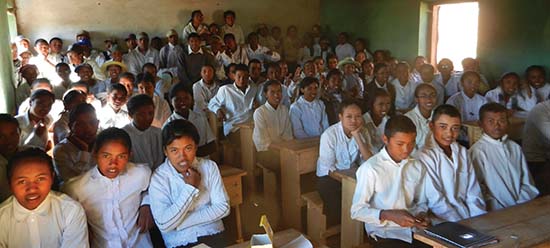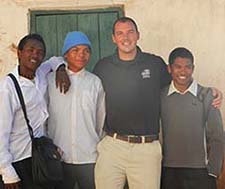When Anders Nordquist '10 arrived in the village of Manalalondo on the island of Madagascar, one of the first things he noticed was the wire hoop. Attached to a tree, the battered bit of metal hovered over a dusty patch of well-worn earth—the town basketball court.
This sign of enthusiasm for his favorite American sport gave the Peace Corps volunteer a starting point. He began introducing himself with a sentence he had perfected during his 10-week crash course in Malagasy, his new language: Tiako milalao basket: "I like to play basketball." The villagers, for their part, were mesmerized by the tall, fair-skinned Westerner who had come to live with them. "Everything about me was different," says Nordquist. "I stuck out like a sore thumb. People followed me everywhere. Even now, months later, I have crowds peering in my windows just watching me."
The villagers couldn't figure out why someone who lived in America, a land of glittering wealth, would choose to spend two years in a place with no running water and no electricity, teaching in a school without textbooks or supplies. The single dirt road running through the village center is so bad that it takes the weekly taxi, an old German box truck with bench seats in back, four or five hours to make the 40-mile drive to the capital city of Antananarivo. During the rainy season, the journey is even longer. "On one return trip, we broke down in the mud," recalls Nordquist, "and we all just got off and walked the remaining 10 miles back to the village—elderly grandparents, mothers with babies on their backs, all of us."
Located 400 miles off the east coast of Africa, Madgascar, the world's fourth largest island, is often called "the eighth continent." The country's biodiversity is legendary: 90 percent of the wildlife is found nowhere else on earth. "It's a stunningly beautiful place," says Nordquist. "But it's so remote and so difficult to get to that there's hardly any tourism." The United States, from this isolated island vantage point, seems like a distant planet, making one of Nordquist's goals especially challenging. "One important purpose of the Peace Corps is to teach people to better understand Americans," he says. "I'm always telling people that what they see in the movies isn't true—it's fake. 'I'm an American,' I tell them, 'but I don't live in New York City, I don't drive a BMW, and I don't have dozens of girlfriends!'"

|
The son of a nurse and a truck driver, Nordquist grew up in New Durham, N.H., and is the first in his family to travel to a foreign country. It was especially hard in the beginning—the language barrier, the isolation, the stress of being the constant center of attention all took a toll. The food was the hardest of all. Turns out the Malagassi people eat, per capita, more rice than any other country in the world. And almost nothing else. "I lost 20 pounds in three weeks," says Nordquist, a 6-foot, 2-inch athlete used to the all-you-can-eat bounty of the UNH dining halls.
Today, he spends most of his time teaching English—to six classes of 50 or 60 high school students equipped only with a notebook, a pencil, and a ruler. "Basically, we're creating a textbook as we go," says Nordquist, who writes on a chalkboard as students copy lessons into their notebooks. When he's not in the classroom, Nordquist puts his major in kinesiology, with an emphasis on physical education, to work coaching basketball.

|
After more than a year in Manalalondo, Nordquist is not just a curiosity. He is a favorite teacher and fellow villager, a basketball coach and the motivating force behind the school's two new courts, built by students and community members working together to dig and grade the earth. Nordquist feels lucky to be surrounded by so many friends—people who invite him into their homes to eat even if he's just passing by the front doorway. People who like nothing better than a good conversation. People for whom time is not something to measure, but something to enjoy. "There's no reason to rush here," says Nordquist. "No meetings. No appointments. Nothing to get to. People just take their time. And they really listen. "
When he moves on after his two years in the Peace Corps, Nordquist hopes to find a job that will allow him to stay in the country that has taught him so much, that has begun to feel like home. Along with his expanded sense of time and hospitality, he will carry with him an altered understanding of the world and his role in it. He will leave behind in Manalalondo many good friends, a better understanding of Americans—and a few new basketball courts. ~
Page: 1 2 3 4 5 6 Next >







